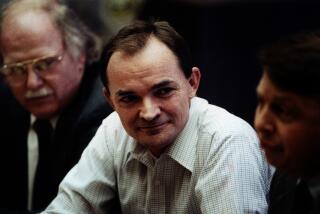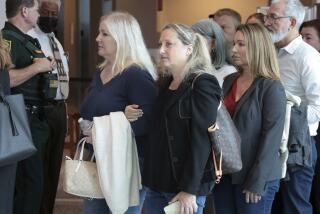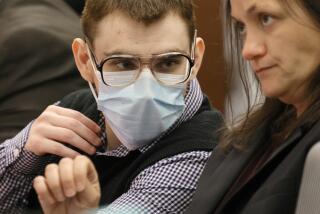Kraft Trial Enters Final Week of Testimony
- Share via
The Randy Steven Kraft serial murder trial, now a little more than a year old, appears to be in its final complete week of testimony, with jurors scheduled to decide next week whether he should be executed.
Kraft, now 44, a Long Beach computer analyst convicted in May of 16 Orange County murders, has not testified in his own behalf, but jurors are hearing plenty from him during this penalty phase of the trial as he questions every witness who knew him before his 1983 arrest.
After two weeks of defense testimony in Superior Court in Santa Ana, jurors have heard from nearly a dozen members of Kraft’s family, his closest friends from high school and college and even his high school tennis coach and English teacher.
Kraft attorneys have also put three clergymen on the stand: An Episcopalian, a rabbi and a Catholic. None of them had met Kraft until recently at Orange County Jail, but all of them testified that they like him and asked jurors to spare his life.
Kraft attorneys have also put on the stand a psychiatrist who testified that a brain test called a PET-Scan shows that Kraft has brain abnormalities that may have affected his control of emotions and sexual urges.
“We hope we are having some impact with the jury,” Kraft attorney C. Thomas McDonald said of the defense testimony. “We’ve shown that Randy’s not just a bad person.”
Some of Kraft’s own questions appear to be obscure to court-watchers. He sometimes asks, for example, whether people knew him when he lived at certain addresses, and he asked one friend whether he remembered that Kraft used to be a newspaper delivery boy.
But McDonald said he believes that all the questions will help the jurors.
“We are showing a mosaic of his life,” McDonald said.
McDonald said the last of his witnesses should finish testifying Thursday. Deputy Dist. Atty. Bryan F. Brown is expected to have one day of rebuttal witnesses, then both sides will prepare for the closing arguments they will deliver before the case goes to the jury.
Kraft was arrested May 14, 1983, when two California Highway Patrol officers found a dead Marine in the front passenger seat of his car. The victim had been strangled and his wrists bound in a fashion similar to many other victims in unsolved area murders over more than a decade.
Kraft has since been accused by prosecutors of 45 murders in three states. All the victims were young men, most ages 18 to 25. They included Marines, transients, men traveling to a job or simply in transit. The victims, except two unidentified men about whom little is known, appear to have one common denominator: They were all without transportation when last seen alive.
Kraft has denied in a jailhouse interview with The Times in 1983 that he killed anyone. All the members of the defense team say Kraft has never budged from that position, despite overwhelming evidence against him in many of the murders.
For example, pictures of some victims, nude and appearing dead, were found in Kraft’s possession. One victim was seen tied up with a deep strangulation mark on his neck. Clothing and personal items of other victims, including some of the six in Oregon and two in Michigan, were found at Kraft’s home.
Despite the evidence, Kraft’s three sisters, his parents and his many in-laws, nieces and nephews say they believe that he is innocent.
Jurors will have just one issue to decide: Whether to return a death verdict for Kraft or life without parole, which his attorneys seek.
Superior Court Judge Donald A. McCartin will have the final say and could reduce a jury death verdict. However, since capital punishment was reinstated in California 12 years ago, no Orange County judge has overruled a jury’s death verdict.
More to Read
Sign up for Essential California
The most important California stories and recommendations in your inbox every morning.
You may occasionally receive promotional content from the Los Angeles Times.










